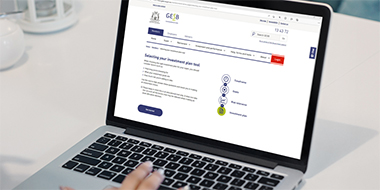Investing during market volatility
Whether you’re an experienced investor or just starting to learn more, a downturn in the market can be stressful. The good news is that history has generally shown that these downturns come and go, and markets generally rebound over time.
Since the outbreak of the COVID-19 coronavirus – and more recently the Russia-Ukraine conflict, which has led to disruption in share markets – many people have felt concerned about their financial futures, including their super.
If you're a savvy investor, you can watch the downturns and know that negative returns are normal every few years, but it’s important to focus on your long-term objectives.
Watch this video or read below for tips that might help you stay focused on your long-term objectives during a downturn.
Top tips for investing during market volatility
Avoid making reactive decisions based on short-term events
Markets tend to rise and fall, so, every few years, there will be a period of negative returns. During these times, it’s even more important to think carefully before making changes to your investment plan.
If you take your money out of an investment when the markets have fallen, you may lock in this loss. You could also risk missing out on any positive returns should the market recover.
However, if you hold onto your investment over the long term, you may be more likely to recover from the low points and perform better than those who try to time their buying and selling of assets based on short-term returns.
Look at history for evidence of how markets have generally recovered
Events of the past few decades have had an enormous impact on financial markets including the share market crash in 1987, the Gulf War, the Asian economic crisis and market collapse, terrorist attacks in the US, the global financial crisis in 2008 and many more.
Markets suffered during these events as investors became nervous about their impact, but history shows that markets recovered over time.
Despite the recent downturn in the market due to COVID-19 and other global events, the long-term returns of our investment plans remain positive and consistent with targets.
Focus on your long-term goals
Reacting to market movements might not suit your long-term investment objectives, if you’re aiming to grow your super and build your retirement savings.
To set long-term objectives:
- Calculate your investment timeframe
Your investment timeframe is how long you expect your money to remain invested in your super or retirement account. It helps to think about when you plan to retire, and once you’re retired, how long you might need your money to last. - Assess the level of risk you are comfortable with when investing
Investment risk is the chance that your investment return will be different from what you expected. Generally, the longer your investment timeframe, the greater the risk you can take. Assets like Shares and Property are considered high risk investments as they can yield high returns but also experience greater fluctuations. On the other hand, assets such as Cash and Fixed Interest are considered low risk investments as the fluctuations are minimal, but the expected returns are also lower. - Choose an appropriate investment plan
To help you assess which plan might suit your needs, try the Selecting your investment plan tool. This tool takes your investment timeframe and other circumstances into account.
You can also explore your investment options: - Stick to your long-term objectives
Think carefully before making changes to your super or investments, as fluctuations in the market are a normal part of an investment cycle.
Keep making contributions
Even during a downturn, it’s important to continue building your retirement savings to help you stay on track with your long-term objectives. Investing during a downturn could mean that you invest when unit prices are low, so you’ll benefit if the prices rise later as a result of a rebounding market.
Minimise your withdrawals
To help protect your retirement savings in a falling market, one important thing you can do is to minimise any withdrawals from your super or retirement income account. This means you can reduce the need to sell your investment assets and keep more of your money invested, giving the market time to recover.
If you’re retired or close to retiring, you might like to read our article for tips on how to manage your income payments in an uncertain market.
Get professional advice
If you're building a house, starting a business or making some important financial decisions, you would usually get advice to help achieve the best outcome. It's the same with your retirement savings. Instead of building your nest egg alone, a qualified adviser can help you understand the best approach to getting the results you want.
Learn more about investment and performance

How we invest
Find out more about how we investLearn more about how we invest including how we diversify our investment plans to help you grow your super over the long term.

Investment update
Read our latest investment updateRead our latest investment update to find out what’s been happening in investment markets and how we’ve been managing your super or retirement account.

Selecting your investment plan tool
Use our investment plan toolDiscover which investment plan might best suit your needs based on your investment timeframe, your investment goals and how comfortable you are with risk.
For more information on your investment options including our investment plans and performance, see the Investment and performance section of our website.
More information
- Download our Investment choice brochure
Need help?
- Call us on 13 43 72
Past performance should not be relied on as an indication of future performance.
Thank you for printing this page. Remember to come back to gesb.wa.gov.au for the latest information as our content is updated regularly. This information is correct as at 27 April 2024.